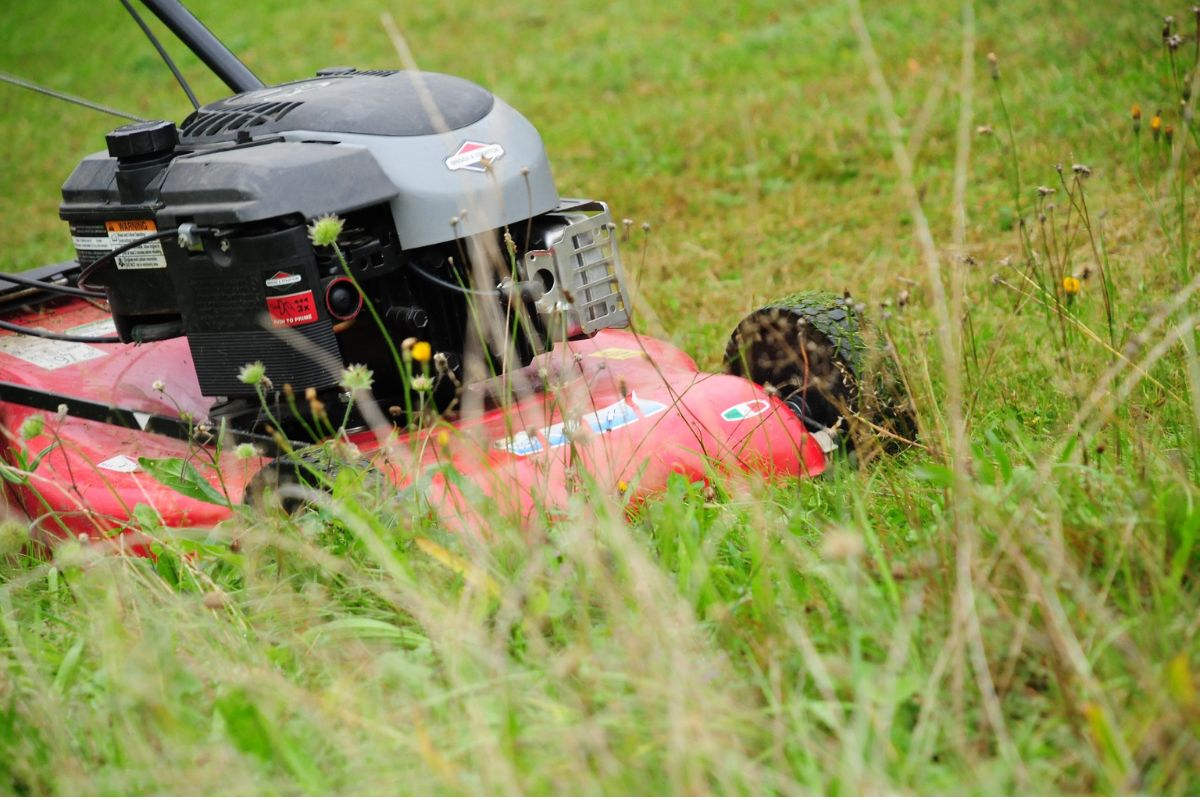Summer is a great time of the year for outdoor activities, including taking care of your yard.
Unfortunately, it’s at this same time that many heavy machinery – especially those used outdoors – are most susceptible to overheating.
But can lawn mowers overheat?
Well, the truth is your trusty ol’ lawn mower can also overheat, just like most other machines…
In this article, I’ll discuss what happens when a lawnmower overheats and how to prevent it from happening in the first place. So let’s get started!
Common Causes Of Overheating
Heat buildup is a common problem with lawnmowers and if it isn’t addressed quickly enough there could be serious consequences.
The key to avoiding this kind of damage is understanding the causes so that they can be prevented ahead of time.
Overheating is mainly due to:
- Clogged engine parts – air filters, cooling fins, cutting decks and the air vents
- Faulty muffler
- Engine oil – it could be too little, too old or the wrong type.
- Blunt blades
- Debris in the mower deck
- Overworking the machine
With these facts in mind, how can you reduce heat output from your machine? Read on!
Reducing Heat Output
It’s important to take steps to reduce the likelihood of your lawn mower overheating.
Airflow optimization is key.
Good airflow helps keep temperatures low, which in turn keeps the mower running at optimal levels.
You should also be monitoring temperature regularly – if it starts to get too hot, you’ll want to shut down the engine quickly before any damage occurs.
Check for fuel errors too; a clogged air filter or improperly mixed gas can cause an engine to heat up unexpectedly.
The spark plug should also be checked periodically, as a faulty one may result in increased heat output from your lawn mower.
Finally, make sure the cooling system isn’t blocked by debris – this could stop coolant from circulating properly and lead to higher than normal temperatures.
All these measures will ensure that your lawn mower stays healthy and runs reliably all year round. But you must know the signs to look out for when it comes to overheating. Coming up next!
Warning Signs To Look Out For
It’s important to be aware of the warning signs of overheating when it comes to lawn mowers.
The most common sign that your mower is heating is if it keeps locking up and shutting off on the job.
Most lawn mowers should be cooled down after 30-45 minutes of use. You’ll know it’s time for a break when you notice smoke or smell something funny coming from the engine.
When diagnosing potential causes of overheating, look out for:
- Airflow issues
- Fuel quality
- Faulty or worn-out engine components
- Low Coolant levels
If you notice any absurd issues, it could be a sign of trouble ahead.
TIP: Poor maintenance practices can increase temperature levels, so make sure that you are using preventative measures like regular oil changes and clean air filters to keep your mower running efficiently.
Not only can an overheated engine lead to costly repairs, but it may also cause a safety hazard.
So, do your best to keep overheating at bay. You can always employ the following routine maintenance tips.
Maintenance Tips
Maintaining your lawn mower is one of the best ways to keep it running smoothly and avoid overheating. Taking a few simple steps can make all the difference. For instance:
- Storing correctly
- Selecting the right fuel
- Ensuring proper air flow
- Sharpening the blades regularly
- Inspecting your cooling system regularly for any blockages or signs of wear that could cause it to overheat.
Taking time each season to properly maintain your machine will save you not only money but also a lot of frustration down the road.
If you take good care of your lawn mower, you will rarely find yourself in need of repairs due to an overheated engine.
Conclusion
As discussed above, it’s clear that lawn mowers do overheat. So, it’s important to understand how a lawn mower works and the potential risks of an overheating engine.
To keep your mower healthy and running smoothly, it’s important to get regular servicing. Then pay attention to its performance while in use and take breaks regularly so that it never has a chance to get too hot!
It may sound cliché but prevention really is better than cure in this case; if you stay on top of things now then you won’t have any issues down the line – no pun intended!
Frequently Asked Questions
What Type Of Oil Should I Use In My Lawn Mower?
When it comes to maintaining your lawn mower, one of the key things you need to consider is what type of oil you’re using.
Choosing the right mix of oils can make all the difference when it comes to lubricating parts and keeping your mower running in tip-top shape.
You want to make sure that the viscosity of the oil matches up with what’s recommended for your model.
Doing your research on mixing oils can help prevent overheating and ensure your mower stays running smoothly!
Does My Machine Require Servicing?
Regular servicing of a lawn mower is like changing the oil in your car – it’s an important part of keeping it running smoothly.
Servicing involves:
- Inspecting and cleaning air filters
- Checking spark plugs, cooling fans or cords
- Ensuring proper tension on belts
- Changing oil regularly
- Changing blades
Different fuel types may require different servicing protocols, so be sure to check with the manufacturer.
How Long Should A Mower Run Before It Needs Cooling Down?
It’s important to make sure you don’t let your mower run for too long without a break – if you do so, it could overheat and cause damage to the engine!
A good rule of thumb is to turn off your machine after about 30 minutes of use. This will give it enough time to cool down and prevent any overheating issues.
How Can I Tell If My Machine Is Overheating?
Have you ever had your lawn mower cut out without warning? It may have been because it was overheating.
Another way sign that your mower’s too hot for its own good is sluggish performance and smoke billowing from the exhaust.
You can prevent this by monitoring the temperature and checking for heat buildup, adding lubricant to moving parts, and making sure the cooling system is working properly.
By doing these simple steps, you’ll help ensure that your lawn mower will keep running smoothly and won’t overheat – preventing any costly repairs down the line!
What Types Of Problems Can Occur If Mower Overheats?
If your mower does overheat however, you’re likely to find that engine problems start to arise – like damage to the piston rings, cylinder head gasket, valves, seals and other components.
You may notice that the mower suddenly stops working and shuts down while you’re on the job.
Don’t let an overheated lawn mower ruin your day – make sure regular check-ups and maintenance help keep it running like clockwork!
Photo by Maria-Anne.


